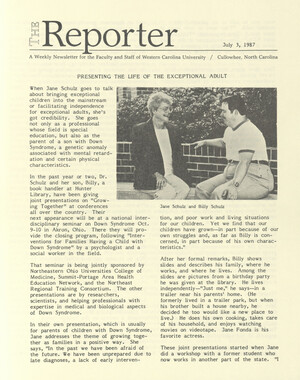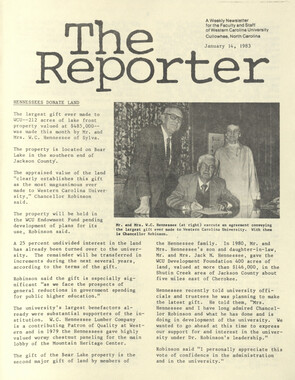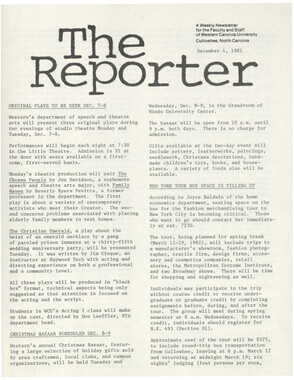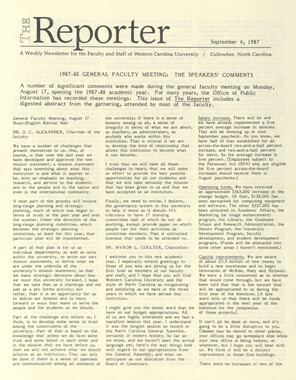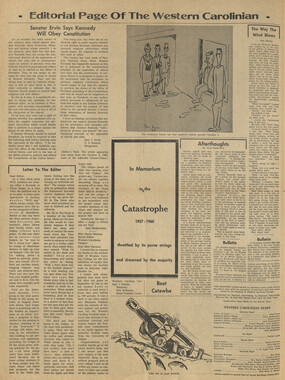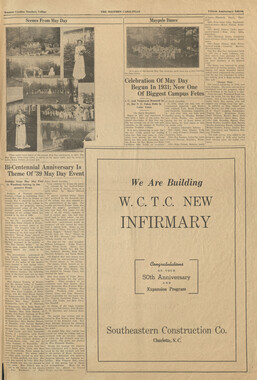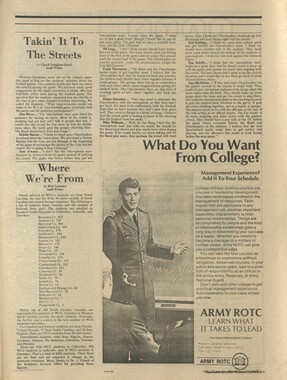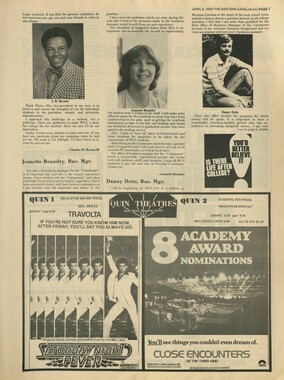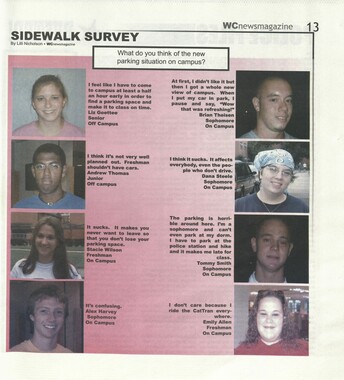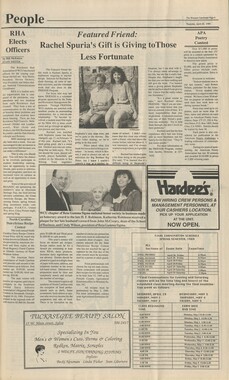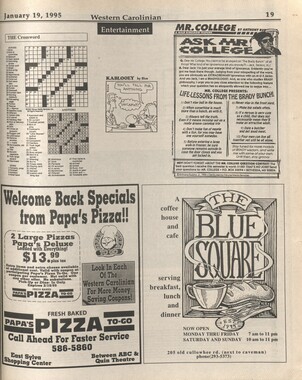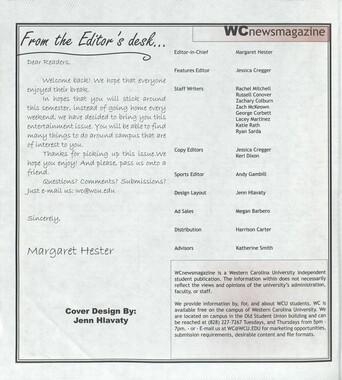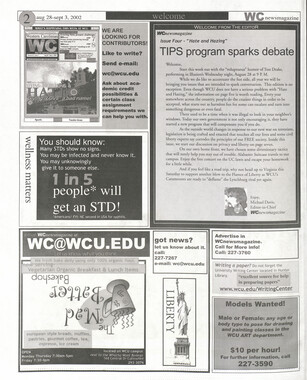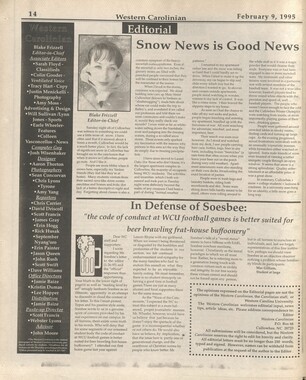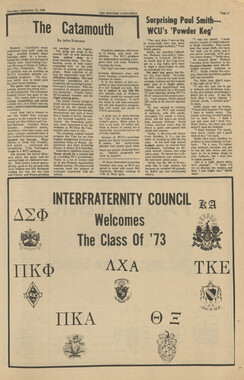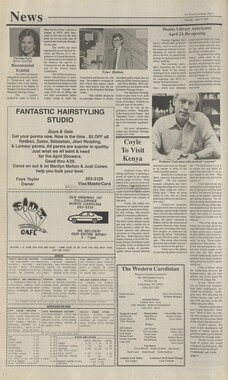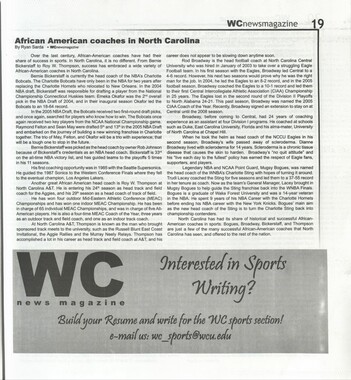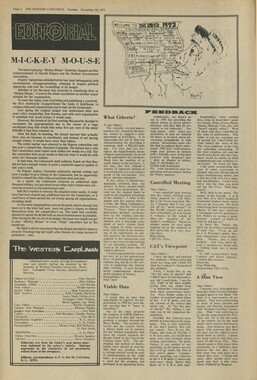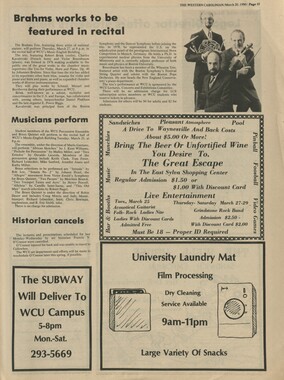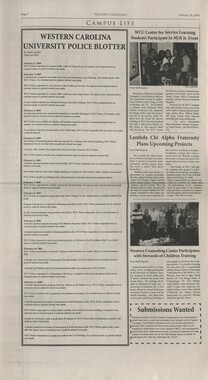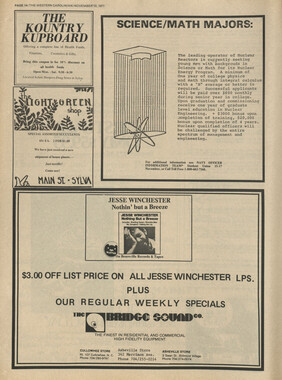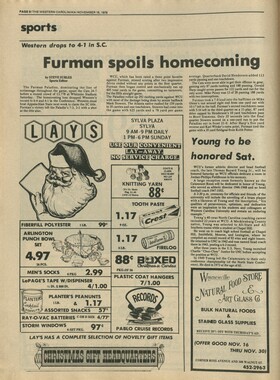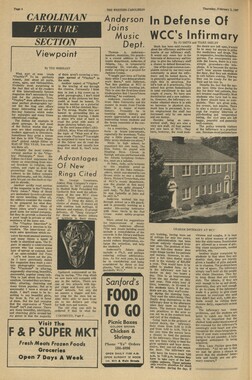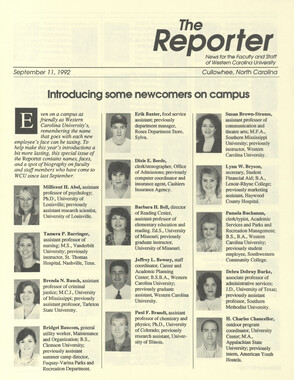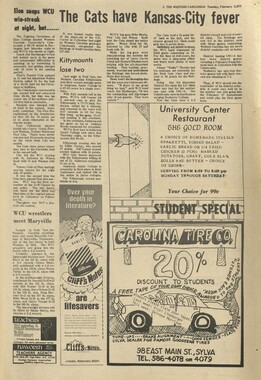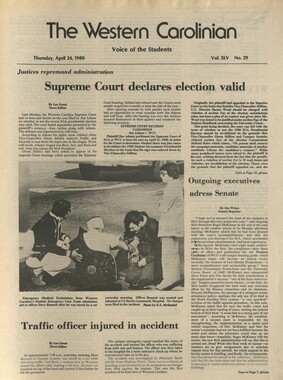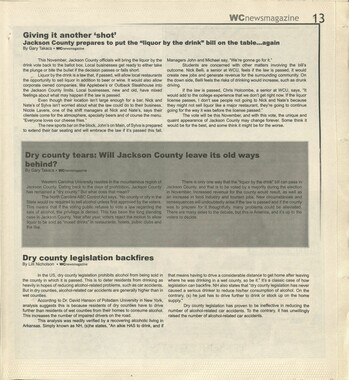Western Carolina University (20)
View all
- Canton Champion Fibre Company (2308)
- Cherokee Traditions (291)
- Civil War in Southern Appalachia (165)
- Craft Revival (1942)
- Great Smoky Mountains - A Park for America (2946)
- Highlights from Western Carolina University (430)
- Horace Kephart (941)
- Journeys Through Jackson (159)
- LGBTQIA+ Archive of Jackson County (85)
- Oral Histories of Western North Carolina (314)
- Picturing Appalachia (6873)
- Stories of Mountain Folk (413)
- Travel Western North Carolina (160)
- Western Carolina University Fine Art Museum Vitreograph Collection (129)
- Western Carolina University Herbarium (92)
- Western Carolina University: Making Memories (738)
- Western Carolina University Publications (2491)
- Western Carolina University Restricted Electronic Theses and Dissertations (146)
- Western North Carolina Regional Maps (71)
- World War II in Southern Appalachia (131)
University of North Carolina Asheville (6)
View all
- Allanstand Cottage Industries (62)
- Appalachian National Park Association (53)
- Bennett, Kelly, 1890-1974 (1463)
- Berry, Walter (76)
- Brasstown Carvers (40)
- Carver, George Washington, 1864?-1943 (26)
- Cathey, Joseph, 1803-1874 (1)
- Champion Fibre Company (233)
- Champion Paper and Fibre Company (297)
- Cherokee Indian Fair Association (16)
- Cherokee Language Program (22)
- Crowe, Amanda (40)
- Edmonston, Thomas Benton, 1842-1907 (7)
- Ensley, A. L. (Abraham Lincoln), 1865-1948 (275)
- Fromer, Irving Rhodes, 1913-1994 (70)
- George Butz (BFS 1907) (46)
- Goodrich, Frances Louisa (120)
- Grant, George Alexander, 1891-1964 (96)
- Heard, Marian Gladys (60)
- Kephart, Calvin, 1883-1969 (15)
- Kephart, Horace, 1862-1931 (313)
- Kephart, Laura, 1862-1954 (39)
- Laney, Gideon Thomas, 1889-1976 (439)
- Masa, George, 1881-1933 (61)
- McElhinney, William Julian, 1896-1953 (44)
- Niggli, Josephina, 1910-1983 (10)
- North Carolina Park Commission (105)
- Osborne, Kezia Stradley (9)
- Owens, Samuel Robert, 1918-1995 (11)
- Penland Weavers and Potters (36)
- Roberts, Vivienne (15)
- Roth, Albert, 1890-1974 (142)
- Schenck, Carl Alwin, 1868-1955 (1)
- Sherrill's Photography Studio (2565)
- Southern Highland Handicraft Guild (127)
- Southern Highlanders, Inc. (71)
- Stalcup, Jesse Bryson (46)
- Stearns, I. K. (213)
- Thompson, James Edward, 1880-1976 (226)
- United States. Indian Arts and Crafts Board (130)
- USFS (683)
- Vance, Zebulon Baird, 1830-1894 (1)
- Weaver, Zebulon, 1872-1948 (58)
- Western Carolina College (230)
- Western Carolina Teachers College (282)
- Western Carolina University (2008)
- Western Carolina University. Mountain Heritage Center (18)
- Whitman, Walt, 1819-1892 (10)
- Wilburn, Hiram Coleman, 1880-1967 (73)
- Williams, Isadora (3)
- Cain, Doreyl Ammons (0)
- Crittenden, Lorraine (0)
- Rhodes, Judy (0)
- Smith, Edward Clark (0)
- Appalachian Region, Southern (2569)
- Asheville (N.C.) (1923)
- Avery County (N.C.) (26)
- Blount County (Tenn.) (195)
- Buncombe County (N.C.) (1672)
- Cherokee County (N.C.) (283)
- Clay County (N.C.) (555)
- Graham County (N.C.) (236)
- Great Smoky Mountains National Park (N.C. and Tenn.) (519)
- Haywood County (N.C.) (3569)
- Henderson County (N.C.) (70)
- Jackson County (N.C.) (4912)
- Knox County (Tenn.) (35)
- Knoxville (Tenn.) (13)
- Lake Santeetlah (N.C.) (10)
- Macon County (N.C.) (420)
- Madison County (N.C.) (215)
- McDowell County (N.C.) (39)
- Mitchell County (N.C.) (132)
- Polk County (N.C.) (35)
- Qualla Boundary (982)
- Rutherford County (N.C.) (76)
- Swain County (N.C.) (2182)
- Transylvania County (N.C.) (270)
- Watauga County (N.C.) (12)
- Waynesville (N.C.) (86)
- Yancey County (N.C.) (72)
- Aerial Photographs (3)
- Aerial Views (60)
- Albums (books) (4)
- Articles (1)
- Artifacts (object Genre) (228)
- Bibliographies (1)
- Biography (general Genre) (2)
- Cards (information Artifacts) (38)
- Clippings (information Artifacts) (191)
- Copybooks (instructional Materials) (3)
- Crafts (art Genres) (622)
- Depictions (visual Works) (21)
- Design Drawings (1)
- Drawings (visual Works) (185)
- Envelopes (73)
- Exhibitions (events) (1)
- Facsimiles (reproductions) (1)
- Fiction (general Genre) (4)
- Financial Records (12)
- Fliers (printed Matter) (67)
- Glass Plate Negatives (381)
- Guidebooks (2)
- Internegatives (10)
- Interviews (815)
- Land Surveys (102)
- Letters (correspondence) (1013)
- Manuscripts (documents) (618)
- Maps (documents) (177)
- Memorandums (25)
- Minutes (administrative Records) (59)
- Negatives (photographs) (6090)
- Newsletters (1290)
- Newspapers (2)
- Notebooks (8)
- Occupation Currency (1)
- Paintings (visual Works) (1)
- Pen And Ink Drawings (1)
- Periodicals (193)
- Personal Narratives (10)
- Photographs (12976)
- Plans (maps) (1)
- Poetry (5)
- Portraits (4568)
- Postcards (329)
- Programs (documents) (181)
- Publications (documents) (2443)
- Questionnaires (65)
- Relief Prints (26)
- Sayings (literary Genre) (1)
- Scrapbooks (282)
- Sheet Music (2)
- Slides (photographs) (402)
- Songs (musical Compositions) (2)
- Sound Recordings (796)
- Specimens (92)
- Speeches (documents) (18)
- Tintypes (photographs) (8)
- Transcripts (322)
- Video Recordings (physical Artifacts) (23)
- Text Messages (0)
- A.L. Ensley Collection (275)
- Appalachian Industrial School Records (7)
- Appalachian National Park Association Records (336)
- Axley-Meroney Collection (2)
- Bayard Wootten Photograph Collection (20)
- Bethel Rural Community Organization Collection (7)
- Blumer Collection (5)
- C.W. Slagle Collection (20)
- Canton Area Historical Museum (2110)
- Carlos C. Campbell Collection (462)
- Cataloochee History Project (64)
- Cherokee Studies Collection (4)
- Daisy Dame Photograph Album (5)
- Daniel Boone VI Collection (1)
- Doris Ulmann Photograph Collection (112)
- Elizabeth H. Lasley Collection (1)
- Elizabeth Woolworth Szold Fleharty Collection (4)
- Frank Fry Collection (95)
- George Masa Collection (173)
- Gideon Laney Collection (452)
- Hazel Scarborough Collection (2)
- Hiram C. Wilburn Papers (28)
- Historic Photographs Collection (236)
- Horace Kephart Collection (861)
- Humbard Collection (33)
- Hunter and Weaver Families Collection (1)
- I. D. Blumenthal Collection (4)
- Isadora Williams Collection (4)
- Jesse Bryson Stalcup Collection (47)
- Jim Thompson Collection (224)
- John B. Battle Collection (7)
- John C. Campbell Folk School Records (80)
- John Parris Collection (6)
- Judaculla Rock project (2)
- Kelly Bennett Collection (1482)
- Love Family Papers (11)
- Major Wiley Parris Civil War Letters (3)
- Map Collection (12)
- McFee-Misemer Civil War Letters (34)
- Mountain Heritage Center Collection (4)
- Norburn - Robertson - Thomson Families Collection (44)
- Pauline Hood Collection (7)
- Pre-Guild Collection (2)
- Qualla Arts and Crafts Mutual Collection (12)
- R.A. Romanes Collection (681)
- Rosser H. Taylor Collection (1)
- Samuel Robert Owens Collection (94)
- Sara Madison Collection (144)
- Sherrill Studio Photo Collection (2558)
- Smoky Mountains Hiking Club Collection (616)
- Stories of Mountain Folk - Radio Programs (374)
- The Reporter, Western Carolina University (510)
- Venoy and Elizabeth Reed Collection (16)
- WCU Gender and Sexuality Oral History Project (32)
- WCU Mountain Heritage Center Oral Histories (25)
- WCU Oral History Collection - Mountain People, Mountain Lives (71)
- WCU Students Newspapers Collection (1923)
- Western North Carolina Tomorrow Black Oral History Project (69)
- William Williams Stringfield Collection (2)
- Zebulon Weaver Collection (109)
- African Americans (390)
- Appalachian Trail (35)
- Artisans (521)
- Cherokee art (84)
- Cherokee artists -- North Carolina (10)
- Cherokee language (21)
- Cherokee pottery (101)
- Cherokee women (208)
- Church buildings (189)
- Civilian Conservation Corps (U.S.) (111)
- College student newspapers and periodicals (2012)
- Dams (107)
- Dance (1023)
- Education (222)
- Floods (61)
- Folk music (1015)
- Forced removal, 1813-1903 (2)
- Forest conservation (220)
- Forests and forestry (1184)
- Gender nonconformity (4)
- Great Smoky Mountains National Park (N.C. and Tenn.) (181)
- Hunting (45)
- Landscape photography (25)
- Logging (119)
- Maps (83)
- Mines and mineral resources (8)
- North Carolina -- Maps (18)
- Paper industry (38)
- Postcards (255)
- Pottery (135)
- Railroad trains (72)
- Rural electrification -- North Carolina, Western (3)
- School integration -- Southern States (2)
- Segregation -- North Carolina, Western (5)
- Slavery (5)
- Sports (452)
- Storytelling (243)
- Waterfalls -- Great Smoky Mountains (N.C. and Tenn.) (66)
- Weaving -- Appalachian Region, Southern (280)
- Wood-carving -- Appalachian Region, Southern (328)
- World War, 1939-1945 (173)
The Reporter, January 1989
-
The Reporter is a publication produced by Western Carolina University featuring news, events, and campus community updates for faculty and staff. The publication began in August of 1970 and continues digitally today. Click on the link in the “Related Mate
-
-
THF REPORTER A Weekly Newsletter for the Faculty and Staff of Western Carolina University Cullowhee, North Carolina January 6,1989 John Newman, a systems analyst in the Computer Center, shows off his h iking boots. From hacker to hiker For this campus computer user, booting up means more than one thing Who says that computer operators must be nerdy little fellows who rarely get outdoors? Who says their interests seldom go beyond random access memory and the latest software update? Certainly not John Newman. A systems analyst in the university Computer Center, Newman is also an accomplished hiker, as comfortable on the Appalachian Trail as in front of a computer monitor. His interests, he said, have a major common source: curiosity—the need to know how things work. "My dad exposed me early to nature, and I grew t o love it. He also exposed me, in nature and elsewhere, to a quest for knowledge. It was directed in many ways," Newman said. As a youngster in Dandridge, Tenn., Newman spent a lot of time looking for arrowheads around Tennessee Valley Authority lakes when the water was low and hunting squirrels with his father, though Newman found he enjoyed watching the animals more than shooting them. Today, just as he uses computer logic to locate or store information for campus administrators or to contribute to the central computerized student information network, Newman also appreciates the logical systems of nature. The revolution of the seasons, the cycle of rain and evaporation, or the veins in a leaf are intriguing to him. Newman began walking the Appalachian Trail (the "A.T.," in hiker parlance) almost six years ago, and since March 1983 he's logged more than 1,800 miles on the path, which stretches some 2,100 miles from Georgia to Maine. Last July he walked 300 miles in eighteen days, starting in Great Barrington, Mass., and finishing in Crawford Notch, N.H. cam,^ Regional economic goals will be presented New regional economic development goals for western North Carolina forged over the last year by the Regional Economic Strategy Project at the Center for Improving Mountain Living (CIML) will be presented in Asheville on Monday, January 9. In addition, eight co-chairmen will be announced to guide four task forces, each addressing an immediate objective targeted by the project for the seventeen western counties. During the past year, hundreds of area citizens and leaders participated in setting the regional economic goals through a series of forums held in Asheville, Boone, Burnsville, Cullowhee, Rutherfordton, and Murphy. Common problems and issues identified in the regional meetings were synthesized by a twenty-eight-member technical committee into issues critically important to the region's economic future. The issues were endorsed by a nineteen-member steering committee. The resulting report, "Strategies for the Economic Future of Western North Carolina: An Agenda for Action," will be made public January 9 at a 6:30 p.m. dinner meeting at the Grove Park Inn in Asheville. Presiding at the dinner will be Chancellor Myron L. Coulter. Other speakers include Billy Ray Hall, president of the North Carolina Rural Economic Development Center, which helped fund the project; and CIML's Bruce S. Boggs, project director. Other funding for the Regional Economic Strategy Project was provided by the Tennessee Valley Authority and the 1987 North Carolina General Assembly through the University of North Carolina. Hiker cont'd Of course, though Newman points out the similarities between working with computers and hiking the A.T., he said the outdoors also offers a great escape from the blinking cursor. "I do the hiking to get away, to put myself back together," he said. Like any serious Appalachian Trail hiker, Newman hopes to make it to "Big K," or Katahdin, the mountain in Maine's Baxter State Park that serves as the A.T.'s northern terminus. If all goes as planned, he'll be there sometime this summer. For two years he has been an official Appalachian Trail "maintainer," volunteering time and effort for the upkeep of a 5.2-mile portion of the trail near Franklin and the overnight shelters interspersed along its length. As work trip coordinator for the southern area of the Appalachian Long distance Hikers Association (ALDHA), he plans two yearly trips for work crews—one in the spring, one in the fall. "It's a way of paying the Trail back for the pleasure and sense of well-being it gives me," he said. Last fall Newman published an article entitled "Cable Gap Renovation— Volunteers in Action," in the Appalachian Trailway News, describing his participation in the renovation of a shelter southwest of Fontana Lake. It was his first time in print. Being a computer-type was definitely to his advantage in getting published. On his way to Massachusetts last July, Newman stopped in West Virginia, where the News is published by the Appalachian Trail Conference, to have breakfast with the editor of the journal. Newman provided not just a printed copy of his article, but a Macintosh computer disk containing the manuscript as well. The editor liked Newman's writing and appreciated the disk copy, which would mean less typesetting and word-processing for her staff. She told him on the spot that the article would appear in the September/October issue. Newman has worked with computers since the early 1960s, before the proliferation of microcomputers, and he has seen many changes in the field. When he came to Cullowhee in 1971 as a data processing manager, for example, information was entered on punchcards and the total memory capacity shared by all campus computer users was less than that of today's basic microcomputer. Newman's long association with the machines has freed him from the phobias that sometimes plague users. His perspective is that computers work for humans, and not vice versa. He maintains that "computers should free us up to think and be more philosophical." He writes poetry and enjoys wood-carving, which he taught at Southwestern Technical College in Sylva for six years. A runner, he completes twelve to twenty miles each week on the university's cross country trail, even stopping along the way to do pushups at the trail's fitness stations. He's also a photographer, and he carries his trusty Olympus to make nature photos when he hikes. Yet sometimes his own simple remembered impressions of the Appalachian Trail are more vivid to him than pictures. "The nice thing about hiking," he said, "is that, even when it's finished, you can go there in your mind anytime you want." - Joey Price CIML staff attend fall conferences Several members of the staff of the Center for Improving Mountain Living (CIML) participated in national and statewide activities in October. • Nancy Blanks (International Programs) served on the national review panel for proposals under the Community Grant program of the Office of Family Support, Department of Health and Human Services, in Washington, D.C. • Bruce Boggs and Gary Brown (Regional Economic Strategies Project) attended a meeting entitled "The State's Agenda for Rural Economic Development" in Raleigh. • Nell Cooper and Ed Israel (Western North Carolina Tomorrow) attended the annual convention of the League of Municipalities in Asheville. • Mert Cregger (CIML Director) served on a panel called "Improving University/PVO/Federal Linkages" at an International Science and Education Council meeting in Washington, D.C. • Marsha Crites (Human Resources) and Gary Brown attended trWorking, But Poor," the North Carolina Conference for Social Service in Lake Ju-naluska. Crites also attended a meeting entitled "Work and Family Connections," sponsored by the Bureau of National Affairs in Washington, D.C. • Lynn Dillard (AgeLink) presented a paper on research strategies for intergenerational programs at the first "Conference of Generations United," sponsored in Washington, D.C., by the National Council on Aging. Dillard also gave a presentation entitled "Re-cruiting, Retraining, and Effectively Utilizing Volunteers" before the Southeastern State Agencies on Aging in Winston-Salem. • Susan Gardner (Community Development), Rose Hooper (Information and Communication Specialist), and Gary Brown attended a conference entitled "Acid Rain Problems" in Gatlinburg, Tenn. • Tom McClure (CIML Associate Director) chaired focus groups for the Economic Development Association and served on the "focus group panel" at the conference of the National Association of Management and Technical Assistance Centers in Washington, D.C. McClure also served on panels entitled "Getting Started" and Resources for Workers Owned/ Cooperative/ESOP" at the conference on "Employee Ownership/Worker Owned Businesses" in Nantahala. • Susan Smith (Natural Resources) made a presentation entitled "Pollution Prevention Pays Instruction Manual" in Santa Barbara, Calif., at the "National Conference on Engineering for Waste Reduction," sponsored by the National Engineering Foundation and the Environmental Protection Agency. January 6, 1989 The Reporter News briefs Five in publications have Ramsey Center address Five members of the staff of the Office of Public Information who work primarily in writing and designing publications are housed during 1989 in the Public Information studio space in the Ramsey Center. Campus mail for Christy McCarley, Bill Guillet, Loretta Rattler, Joey Price, and Debra Davis should be addressed to them at 1601 Ramsey Center to expedite delivery. Ice rink remains closed due to warm temperatures The Ramsey Center ice rink remains closed pending cooler weather which will permit refreezing of the ice. The rink has been closed since mid- December, when warming weather conditions made the rink's surface unusable for skating. Robert Stewart, Ramsey Center director, said he hopes skating can resume soon, but unpredictable weather conditions prevent the setting of a precise date for reopening. Announcements concerning the reopening will be made prompdy when weather conditions change. New program offers semester of study in China Western students can spend the fall semester in China under a new semester- abroad program beginning in 1989- 90. Western is one of several universities participating in the program, which is sponsored by Wake Forest University and the South Adantic States Association for Asian and African Studies. Participating students will spend the fall semester studying language and culture at the Chinese Language Training Center of The Chinese Academy of Social Sciences in Beijing. The program, open to graduate and undergraduate students, carries sixteen hours of academic credit. The approximate cost for room, board, tuition, and roundtrip airfare from New York is $5,568. To qualify for the program, a student must have a grade point average of 3.0 or above, a demonstrated ability in the learning of a foreign language and a sincere interest in the study of Chinese culture. Application deadline is February 1, and a $600 deposit is due by June 14. For additional information, call JefFNeff, head of the geosciences and anthropology department, at 227-7268. Cherokee Center classes will begin January 9 Twelve academic credit courses will be offered during the spring semester through the Cherokee Center. Registration for unregistered students will be held at the first class meeting during the first week of classes, January 9-12. Most courses will meet 6:30-9:30 p.m. at Cherokee High School. Course offerings include Elementary Cherokee, Mondays; Intermediate Cherokee, Thursdays; Child Development, Wednesdays (with a one-hour lab with meeting time to be arranged); Study Techniques for College, Mondays; English Composition II, Thursdays; Major American Writers, Mondays; Personal and Community Health, 4-6 p.m. Wednesdays; College Algebra, Tuesdays; Music Appreciation, Wednesdays, Cherokee Center; American Politics and Issues, Thursdays; The Biblical World, Mondays; and Social Inequality, Tuesdays. For more information, call Dr. Lawrence Arney at 227-7151. Campus post office has new temporary location The campus branch of the U.S. Postal Service has been temporarily relocated to allow business to continue as usual during renovation work under way in McKee Building. Beginning Monday, January 9, the campus post office can be found in the old book store, located in Stillwell Building behind Hoey Auditorium. Hours of operation will remain unchanged—from 11 a.m. until 3 p.m. Monday through Friday. The post office will return to McKee when the renovations are complete. University recipes on sale in new book The WCU chapter of the North Carolina Association of Educational Office Personnel (NCAEOP) is selling From the Valley of the Lillies: A Collection of Recipes from Western Carolina University as a fundraising event for the Home Health Agency of Sylva. The cookbook, selling for $7.50, contains recipes from faculty, staff, and students, as well as a bit of WCU history. Proceeds will help the Home Health Agency purchase a "Lifeline" machine to be used by elderly area residents in case of medical emergency. See any campus NCAEOP member to purchase your copy. CIML publishes annual western county profiles The Center for Improving Mountain Living (CIML) has prepared profiles that contain development information on population trends, employment, income, agriculture, education, retail sales, and other demographic indicators for the twenty-eight western counties. This year's edition of the annual profiles also includes maps, charts, and other graphic features. Publication of the county profiles is aided by a grant from the U.S. Economic Development Administration, and single copies of individual counties are available at no charge. Send requests to Profiles, Economic Development Division, Center for Improving Mountain Living, or call 227-7492. January 6, 1989 The Reporter ------- 7 —— New computer calendar lists campus events With a link to the university mainframe, you have access to an up-to-the-minute listing Institutional A new system operating through the Studies and Planning. "Total participation of all university's mainframe computer and accessible by all mainframe compatible terminals now offers up-to-the-minute information about events scheduled on campus. The Campus Events Calendar (CEC) System became operational at the end of fall semester and allows users to search for all scheduled campus events on a particular date, or span of dates, by facility, or by event sponsor. It is the first step in building a computerized campus event scheduling system which will allow facility and support services to be requested and confirmed electronically. In this first stage when an event is scheduled in a major campus facility by the appropriate facility coordinator, the facility coordinator enters the event into the CEC system. Coordinators not currently on-line with the system have their events entered by the Office of Other events, not requiring the use of a campus facility where scheduling authority has been established, including all university scheduled events to be held off-campus, are considered "information only." These event requests may be forwarded to the Office of Institutional Studies and Planning for entry into the CEC or, if they are arranged through the Division of Continuing Education and Summer School, the events may be entered directly by that office. The CEC system can provide the entered information on events, availability or non-availability data about facilities, and maintain a record of events scheduled by organizations. "Systematic and timely input is vital for a truly useful calendar and scheduling system for the campus," said Ken Wood, director of Institutional Studies and Planning and CEC coordinator. campus schedulers of events and facilities will make the system work for everyone." Wood said the CEC system does not define policy for the scheduling or use of campus facilities. Each facility coordinator remains responsible for establishing and enforcing policy for that specific facility subject to existing campus- wide policies. The new system will not be involved in conflict resolution. Chancellor Myron L. Coulter initiated the new calendar/scheduling system with the appointment of Wood as central scheduling officer in June. A University Facilities Scheduling System Committee was named and began meeting with Computer Center representatives Max Williams and Harold Neely to design and test the system. Training sessions for facility coordinators were held in early November and die system became operational late that same month. How to use the CEC System Follow these steps to team about scheduled campus events.You might fmd it helpful to clip these instructions and keep them near your terminal. 1. You must have a DEC compatible terminal or a microcomputer with software to emulate a DEC terminal. 2. The terminal or microcomputer must be able to connect to the WCU computer system, either through a direct line or by dialing-up with a modem. 3. When you have the USERNAME prompt on your screen, log into a special account named PUBLIC. To do so, type the name PUBLIC, then press the <Enter> key. You will not be asked for a password. 4. A menu of options will be displayed on your screen. Locate "Campus Events Calendar" in the menu and enter the corresponding option number into the CEC system. Prompts will lead you through the information search sequence from that point. The TAB key will allow you to move from one field to the next. Press RETURN only after you have entered all the information necessary to start a search. HELP On a microcomputer, the F2 function key serves as a HELP key. Press the F2 key anytime you are unsure what type of information is being requested. On a regular terminal, the PF2 is the HELP key. SEARCHING WITH CEC The screen's initial dates to search are set for the current date. TAB to the beginning and ending date fields and enter new dates to expand the search. If you wish scheduling information on a particular facility, TAB to the facility field, type in the first letter of the name of the building you are interested in, and press RETURN, and a list of the buildings and rooms beginning with that letter will appear. Select the number which corresponds to the facility you want and press RETURN. When all selection criteria have been entered by using the TAB and BACKSPACE keys, press RETURN twice to view all events scheduled for those criteria. The screen will show the first four events. Press RETURN to view the next four events. After you have completed your search, TAB to the SCREEN NBR field and type SO to sign off. If you have problems entering the CEC system or have questions, contact the Office of Institutional Studies and Planning at 227-7239. A Campus Events Calendar System manual will be provided by that office upon request. January 6, 1989 The Reporter People and places ARTS AND SCIENCES • Steve Eberly, Dennis McKevlin, and Jim Nicholl (English) served as judges for the 1988-89 student essay contest of the the Sylva Optimist Club last fall. • Nancy Joyner (English) read a paper entitled "The Three Best Appalachian Women Writers" in November at the South Atlantic Modern Language Association in Washington, D.C. • Joe Meigs (English) read two professional papers last October. He presented "Laughter in Lucky Jim" at the annual meeting of the Popular Culture Association in the South in Knoxville, Tenn., October 6. He read " 'Smalls' and 'Hi' in Raising Arizona" at the International Conference on the Outsider in Literature, Philosophy, and the Visual Arts, which met in Atlanta, Ga., October 29. • Joyce Prewitt (Social Work) attended a thirty-hour workshop on "Curriculum Models and Teaching Strategies for Social Work Education" held during October and November in Asheville and Chapel Hill. Sponsors were the North Carolina Council on Social Work Education and UNC-Chapel Hill's School of Social Work. • Bob Rigdon (Human Services) spoke to the Mountain Pediatric Society at Freedom Escape Lodge in Weaverville December 7. His topic was "Coping with Stress: How Professional Families are Affected. Are We Unique or Different as Compared to the General Population?" • Ed Vassian (Chemistry) presented a paper November 18 at the University of Iowa entided "Preparation and Properties of a Quasi-Aromatic Binuclear Heterocycle Containing Nickel." BUSINESS • Heydar Pourian presented a paper entitled "Issues in International Investments" during the annual meetings of the southeastern chapter of the Institute of Management Sciences last fall. He was elected a chair for next year for general management, international business, and strategy. EDUCATION AND PSYCHOLOGY • Clarence DelEorge (Elementary Education and Reading) presented a paper entitled "How to Put Out Your Burnout" at the twentieth annual conference of the North Carolina Science Teachers Association in Asheville November 12. The paper was coau-thored by Linda DelForge (Biology). NURSING AND HEALTH SCIENCES • David C, Breeding (Environmental Health) attended the seventh annual North Carolina Health and Safety School, held December 2-4 in Raleigh. He delivered three presentations entitled "Industrial Hygiene: Rights and Resources," "Control of Confined Space Hazards," and "Respiratory Protection." The Health and Safety School is sponsored by the North Carolina Coalition for Occupational Safety and Health, a non-profit training and research organization. ADMISSIONS • Drumont Bowman (Director) represented WCU at the annual College Board National Forum in Washington, D.C., November 2-4. The conference's theme was "Educating the Class of 2001: Defining Standards in a Multicultural Society." COUNSELING AND PSYCHOLOGICAL SERVICES • Ruth Gold, along with Judith Stillion (Academic Affairs) and Glenn Stillion (Student Development), gave a presentation entitled "Suicide: A Survey of Programs and Policies on College Campuses" at the annual conference of the Southern Association for College Student Affairs in New Orleans, La., in early November. • John Ritchie led workshops entitled "Counseling Males: Therapy, Men's Groups, and Alternative Approaches" for psychologists, counselors, and other mental health practitioners at the conference of the Southeast College Counseling Center Personnel in Athens, Ga., in early October and at the Mountain Area Health Education Center in Asheville in December. HUNTER LIBRARY • Becky Kornegay conducted two workshops in October and November on bibliographic instruction. The first workshop, held at Wake Forest University, was sponsored by the North Carolina Library Staff Development Program. The second workshop, sponsored by the Piedmont Independent College Association, was held at The Lodge of Elon College. NORTH CAROLINA CENTER FOR THE ADVANCEMENT OF TEACHING • A.G* Rud presented a paper in October at the annual meeting of the South Atlantic Philosophy of Education Society at USC-Spartanburg. In November he attended a long-range planning meeting of the Council for Basic Education in Washington, D.C., and spoke at the opening of the New Literacy Learning Center in Highlands. He attended two committee meetings of the American Philosophical Association Eastern Division in Washington December 27-30. Faculty publications Pourian, Heydar, and Aby, Carroll D., Jr. "Experimental Designs in Event Study Methodologies." Journal of Financial and Strategic Decisions 1 (Fall 1988): 15-27. Kirk, James. 'Trainers and Job Satisfaction." Training and Development Journal 42 (December 1988): 53-57. The Reporter January 6, 1989 CQlcnd^r JANUARY 9-15 — Monday, January 9 8 a.m.-8 p.m. Textbooks issued, Book Store. 8 a.m. STAR van leaves Forsyth parking lot for University of Georgia, Athens. 9-11 a.m. Registration for new undergraduate, new graduate, and readmitted students, Ramsey Center. 11 a.m.-l p.m. Registration for non-registered continuing students, Ramsey Center. 1-4 p.m. Drop/Add, Ramsey Center. 7:30 p.m. Basketball at Appalachian State University, Boone. Tuesday, January 10 8 a.m. Classes begin. 9 a.m.-4 p.m. Registration and drop/add continues, Ramsey Center. 8:30 a.m. Meeting of Executive Committee for Academic Affairs, 510 Robinson Building. 9:30 a.m. Council of Deans, 510 Robinson Building. Wednesday, January 11 1:30-4 p.m. "Update on Interactive Learning," an international teleconference, Hospitality room, Ramsey Center, free. 7 p.m. Opening reception for exhibit of drawings and paintings by Harry I. Naar, Chelsea Gallery, University Center. 7 p.m. Women's basketball at Furman University, Greenville, S.C. 7:30 p.m. Basketball vs. Augusta College, Ramsey Center. Thursday, January 12 Women's basketball vs. Coastal Carolina, Ramsey Center. Friday, January 13 No activities listed. Saturday, January 14 3 p.m. Women's basketball vs. UT-Chatta-nooga, Ramsey Center. 7:30 p.m. Basketball vs. VMI, Ramsey Center. Sunday, January 15 No activities listed. Exhibits Drawings and paintings by Harry I. Naar, Chelsea Gallery, University Center, 8 a.m.-ll p.m. Monday-Friday, January 11-February 8. Student paintings, Gallery 250, Office of Research and Graduate Studies, 250 Robinson Building, 8 a.m.-5 p.m., Monday-Friday. "Drawing: Three Points of View," by seventeen national and regional artists, Belk Building art gallery, 9 a.m.-5 p.m. Monday-Friday and by appointment. "Migration of the Scotch-Irish People," a permanent exhibit, Mountain Heritage Center. "Mountain Trout," an historical exhibit on trout and trout fishing in the Southern Appalachians, Mountain Heritage Center, through August. "Reflections on the Water: Trout in Art and Life," artwork inspired by trout and mountain streams, Mountain Heritage Center, through August. Mountain Heritage Center hours are 8 a.m.-5 p.m. Monday-Friday and 2-5 p.m. Sunday. Hunter Library Spi Regular hours Monday-Thursday 8 a.m.-12:30 a.m. Friday 8 a.m.-9 p.m. Saturday 10 a.m.-6 p.m. Sunday Noon-12:30 a.m. Martin Luther King holiday Friday, January 13 8 a.m.-5 p.m. Saturday, January 14 10 a.m.-6 p.m. Sunday, January 15 Closed Spring break Friday, March 3 8 a.m.-5 p.m. Saturday, March 4 10 a.m.-6 p.m. Sunday, March 5 Closed ring Semester Hours Monday, March 6 to Friday, March 10 8 a.m.-5 p.m. Saturday, March 11 Closed Easter break Thursday, March 23 8 a.m.-5 p.m. Friday, March 24 Closed Saturday, March 25 10 a.m.-6 p.m. Sunday, March 26 4 p.m.-12:30 a.m. Final exams Friday, April 28 8 a.m.-midnight Saturday, April 29 8 a.m.-midnight Sunday, April 30, noon, to Friday, May 5, 5 p.m. Open 24 hours. The Reporter is pu blished by th e Office of Publi c Information. ^CLMUXYy 6, 1989 1,400 copl« of thii public document were printed at t cost of $212, or $.15 per copy. TfiC RcpOTtCf THE REPORTER A Weekly Newsletter for the Faculty and Staff of Western Carolina University Cullowhee, North Carolina January 20,1989 Understanding your state health benefits Shafer If tryin g to understand the state health insurance plan gives you an aching head, don't despair. A staff member in the Personnel Office has the cure for your ailment. "Anytime you're incurring medical expenses, check your handbook first," said Peg Shafer, the university's health benefits representative. "If you don't understand something, or if you th ink your circumstances may be out of the ordinary, call the Personnel Office right away. You might be saving yourself some money." You'll definitely save time and trouble if you know which conditions are covered and which aren't by the Comprehensive Health Benefit Plan, a state program administered by Blue Cross/Blue Shield that last October replaced the Personal Care Plan (PCP). It's helpful also to know the required steps for seeking medical attention. Shafer offers sound advice on insurance, having worked for many years for CNA, a national insurance company offering coverage for everything from personal health to oceangoing tankers. She joined Personnel last March, the same month in which the state released the revised handbook on its health benefit plan. Here are some points Shafer says employees should remember to simplify the claims process: • The plan's deductible amount for each fiscal year is $150 per person, with a maximum of $450 per family. Shafer said these figures are low, as compared with deductibles on insurance purchased through commercial agents elsewhere, and are "the best thing about being insured by the state." • The plan features a policyholder copayment. After you've met the deductible amount for the year, the plan pays 90 per cent of each eligible claim, and you pay 10 per cent, until you've paid an additional total of $300. Then the program pays 100 per cent of covered expenses for the rest of the fiscal year. • Before certain surgical procedures— such as a hysterectomy or coronary artery bypass—the plan requires and pays for a second physician's opinion. Page twenty of your handbook lists the affected surgeries and gives more information on this requirement. • Your member identification number, which you should keep handy Five in Publications Work Have Ramsey Center Address Five members of the staff of the Office of Public Information who work primarily in writing and designing publications are housed during 1989 in the Public Information studio space in the Ramsey Center. Campus mail for Christy McCarley, Bill Guillet, Loretta Rattler, Joey Price, and Debra Davis should be addressed to them at 1601 Ramsey Center to expedite delivery. when discussing a claim, is your social security number plus two digits assigned by Blue Cross/Blue Shield. A quick look at your member card will tell you your complete number. • Your physician must contact Blue Cross/Blue Shield for certification before you can be admitted for a planned inpatient hospital stay. In case of an emergency admission, the physician has forty-eight hours (or until the first business day following the admission) to request certification. He may make the request by phone. • Finally, an appeals process does exist in case you feel you have not received proper coverage. Check the section entitled "Review Procedures" on page twenty-nine of your handbook for the necessary steps. Three insurance "packages" are available through the Comprehensive Health Benefit Plan—coverage for the employee alone ($93.82 monthly), employee and children ($150.12), or employee and family ($225.06). For each package the state contributes $93.82 each month toward the premium, so employee/children coverage actually costs the policyholder only $56.30 monthly, and the employee/ family plan, $131.24. Your premium payment for the Comprehensive Health Benefit Plan is deducted from your paycheck. Shafer also likes to advertise the plan's CostWise program, in which participating doctors agree to forgo their normal fees, charging the policyholder instead fees set by Blue Cross/Blue Shield. CostWise physicians file all claims for covered services, and the patient pays only the deductible and cont'd J CIML project outlines regional economic strategy To improve economic conditions in western North Carolina, the region must improve the availability of business capital, deal with solid waste problems, enhance the contribution of tourism and recreation to the economy, and develop leadership resources. Those priorities for economic development in seventeen western counties (Avery, McDowell, Rutherford, and west) were outlined in Asheville January 9 in a report on the first phase of the Regional Economic Strategy Project launched last March. The regional grassroots economic development project, conducted by the Economic Development Division of the Center for Improving Mountain Living, is being funded by the General Assembly, North Carolina Rural Economic Development Center, and the Tennessee Valley Authority. Chancellor Myron L. Coulter, in releasing the report, said it marks "a turning point in a new endeavor to bring the region together in concerted efforts to revitalize our economy." The goals of the project resulted from a yearlong process that involved more than sixty state and regional leaders, and from forums held in Asheville, Boone, Burnsville, Cullow-hee, Rutherfordton, and Murphy. "People in the region realize that to create a stronger economy, with better-paying jobs and greater opportunity, they must pull together," said Bruce S. Boggs, director of the Regional Economic Strategy Project and author of the report. "Over the long haul no community or county in WNC can achieve its economic potential if the rest of the region continues to lag economically." Boggs said the next phase of the project will begin with organizing task forces to address each of the four major objectives. Eight co-chairmen have accepted the leadership roles. They are: Task Force to Improve the Availability of Business Capital John E. Houser of Asheville, senior vice president and retail banking manager of January 20, 1989 Wachovia Bank and Trust Company; William F. Forsyth, Jr., of Murphy, real estate developer and former banker. Task Force to Reduce Solid Waste and Improve Solid Waste Management William M. Green of Murphy, Cherokee County county manager; David N. Huskins of Ridgetop Associates in Linville Falls and former Mitchell County county manager. Task Force to Enhance the Contribution of Tourism and Recreation to the Economy Jerry Plemmons of Marshall, French Broad Electric Membership Corporation executive; John R. Birdsong of Marion, executive director of the McDowell County Chamber of Commerce. Task Force to Develop Leadership Resources J. Barry Hipps of Cherokee, general manager of the Cherokee Historical Association; Sara M. Morris of Asheville, Asheville-Buncombe Technical Community College director of development. Boggs said the regional task forces will map courses of action that can achieve results over the next one to two years. The task forces will involve people from throughout the region who have relevant expertise or strong interest in the objective. In addition to the four task-force objectives, five secondary objectives for the region are: • Improve transportation systems, with emphasis on strategic highways. • Provide for conservation of WNC's land resources through the establishment of a method of growth management. • Increase public support for continuing improvement of ecuation in the public schools. • Strengthen the region's institutional capacity to produce a work force prepared for technical careers. • Improve the education and skill levels of the region's present work force. Tourism and recreation as driving forces for economic development warrant consideration, the report said. However, the report also said of tourism that "too little is known about the contribution it makes to the WNC economy to justify firm conclusions about its potential" and that it competes for land, places pressure on the environment, and is relatively vulnerable to economic recession. The report said that western North Carolina's greatest strength is in it s people and that confronting the complexity of t he issues facing the region underscores the need for a stronger "civic infrastructure." Study rooms available Hunter Library is accepting applications from graduate students for use of study rooms in the library during spring semester. Application forms are available from department heads, and completed applications should be sent to William Kirwan at Hunter Library by Friday, January 27. Western North Carolina Tomorrow offers regional organization directory Western North Carolina Tomorrow (WNCT) has compiled a directory of community, economic, and tourism development organizations in the state's seventeen westernmost counties. The book is a resource of important contact names and telephone numbers. Single complimentary copies can be ordered at 227-7492. Additional copies are available at a cost of $2.50. On campus, address your request to WNCT, 210 Bird Building. Elsewhere, requests should be addressed to P.O. Box 222, Cullowhee, N.C. 28723. The Reporter Campus events BLOODMOBILE - The American Red Cross bloodmobile will visit the Grandroom of the University Center from noon until 5 p.m. Monday- Wednesday, January 23-25. Four hundred fifty units of blood is the goal for the three-day drive, which is sponsored by Sigma Kappa sorority and Lambda Chi Alpha fraternity. During the 1987-88 academic year, a higher percentage of the WCU population donated blood than at any other school in The University of North Carolina system, to win the first Inter-University of North Carolina Blood Drive Challenge Cup. But Ann P. Hargrove, consultant with the Asheville Regional Office of the American Red Cross, warned that Western's blood drive participation in the fall was below expectations and that high donor turnout in the upcoming drive is essential if Western is to retain the challenge trophy this year. WORDPERFECT SUPPORT - Faculty and staff interested in the WordPerfect word processing package are invited to the first meeting of the WCU WordPerfect Support Group from 2 to 3 p.m. Thursday, January 26, in Room B-15 Forsyth Building. Carolyn Kotlas, a representative of the UNC Educational Computing Service and an active member of the Duke WordPerfect User's Group, will be the guest speaker. Kotlas will offer WordPerfect utilities for copying by persons with formatted 360K (5.25") diskettes. For more information, call Debbie Edwards at 227-7282. GOSPEL SING - The Mountain Heritage Center will present an afternoon of gospel singing Sunday, January 29, at 2:30 p.m. in Founders Auditorium on the first floor of the Robinson Building. The two-hour concert will feature family groups representing traditional black, white, and Cherokee singing styles. The presentation also inaugurates new Sunday afternoon hours from 2 until 5 p.m. at the Mountain Heritage Center. General admission to the concert, for which doors will open at 2 p.m., is $1 for students and senior citizens and $3 for all others. For additional information, call the Mountain Heritage Center at 227-7129. GLASS HARMONICA - Vera Meyer, one of the few concert-quality glass harmonica players in the world, will perform in concert 8 p.m. Monday, January 23, in the Music Recital Hall. The glass harmonica is a rare instrument composed of horizontally mounted glass cups on which sound is produced by lightly touching the rims with clean, wet hands as the cups rotate on a spindle. The sound, described as pure, haunting, and mystical, was rumored in the eighteenth century to have mysterious powers. Meyer's playlist includes Mozart, Bach, Haydn, and popular songs. Her visit is a part of the Lectures, Concerts, and Exhibitions Series. Tickets are $6 for adults, $3 for students, and $1 for WCU students with ID. For additional information, call Dr. Doug Davis at 227-7234. GROWTH GROUPS - The Counseling and Psychological Services Center will offer several "Groups for Growth and Change" during the spring semester, beginning Monday, January 30. Sessions include Dreamwork; Creative Relaxation; Assertiveness Training; Couples Enhancement; Issues in Relationships; Adult Children of Alcoholics; Sharing the Secret: Survivors of Child Sexual Abuse; and Body Image: Learning to Like Yourself. The sessions, open to all students, staff, and faculty, usually run from 3:30 to 5 p.m. Interested persons can register to participate by calling the Counseling Center by Friday, February 3, at 227-7469. MEMORIAL SERVICE - The WCU Inspirational Choir will perform January 22 at the 11 a.m. worship service of the Cullowhee United Methodist Church on campus. The service, cosponsored by Maize's Chapel Zion Church in Sylva and Mount Zion Church in Cullowhee, will feature memorials to Martin Luther King, Jr. The public is invited to attend. For additional information, call the Reverend John Boggs of the Cullowhee United Methodist Church at 293-9715. SOFTWARE SWAP - Carolyn Kotlas of the UNC Educational Computing Services will visit the Computer Center Thursday, January 26, with over 200 diskettes of public domain and shareware software that run on MS-DOS microcomputers. The software will available for copying 8:30 a.m-l:30 p.m. in Room B-15 Forsyth Building by persons who bring formatted 360K (5.25") diskettes.To find out in advance what software will be available, see the UNC-ECS disk collection catalog in the Computer Center's Academic Computing Services offices, Forsyth B- 21 and B-26. Call Debbie Edwards at 227-7282 for more information. that, too. She said her job is to help university employees enjoy the plan's benefits with the least possible hassle. "If you've already been sick," she said, "if you've already been to the doctor, and you've already been out of work, then you don't need to deal with having claim problems." - Joey Price Benefits cont'd copayment amounts. 'The policyholder doesn't have to pay the full amount and then be reimbursed for part," Shafer said. "Once you meet the deductible and copayment, the doctor is paid directly by Blue Cross/Blue Shield." A complete list of CostWise physicians in Jackson County is available in the Personnel Office. For additional help in understanding the state health benefits plan, call Shafer at 227-7218 or call the state plan customer service department at 1-800-422- 4658. If you need a copy of the March 1988 handbook, Shafer can provide The Reporter January 20, 1989 JANUARY 2 3-29 Monday, January 23 "Power of a Dream," an NCCAT seminar, through Saturday. 10 a.m.-lO p.m. Fatal Attraction, a video thriller, second floor, University Center, through Sunday. Noon-5 p.m. Bloodmobile, Grandroom, University Center. 2-5 p.m. Open House, Counseling, Testing, and Psychological Services Center, 114 Scott Hall. 7:30 p.m. Basketball vs. UT-Chattanooga, Ramsey Center. 8 p.m. Recital by Vera Meyer, glass harmonica, Music Recital Hall, $6 adults, $3 youth and children, $1 WCU students with ID. Tuesday, January 24 8 a.m. STAR van leaves Forsyth parking lot for Clemson University. 9:30 a.m. Council of Deans, 510 Robinson Building. Noon-5 p.m. Bloodmobile, Grandroom, University Center. 3:30 p.m. Meeting of Academic Affairs Committee, Cherokee Room, University Center. 6 p.m.-7:30 p.m. Yoga, through February 21, $30 registration. Call 227-7397 for information. Wednesday, January 25 Cafeteria faculty evaluation forms and computer evaluation summaries available in Office of Institutional Studies. Aerobics classes begin. Pre-register University Center, $10 WCU students, $20 faculty and staff. 11 a.m.-noon "Transfer Files Between the VAX and MS-DOS Microcomputers," a "how-to" discussion, registration required (227-7282), free to faculty and staff. Noon-5 p.m. Bloodmobile, Grandroom, University Center. 7 p.m. Billiards tournament, University Center game room, $1. Thursday, January 26 8 p.m. Vocal recital with Scott Agnew, Music Recital Hall. 8 p.m. Basketball at UNC-Asheville. 8:30 a.m.-1:30 p.m. Software swap, Forsyth B-15. 9 p.m.-midnight Mini-concert with "Not Even," University Center Grandroom, $1 WCU students with ID, $3 others. Friday, January 27 Last day to file spring applications for May graduation with dean. Friday Night Skiing at Cataloochee, pre-register University Center, $18 WCU students, $26 faculty and staff. Indoor track: Eastman Invitational, Johnson City, Tenn., through Saturday. Saturday, January 28 Overnight camping, through Sunday, preregister University Center, $10 WCU students, $26 faculty and staff. 7 p.m. Women's Basketball vs. UNC Charlotte, Ramsey Center. 7:30 p.m. Basketball at Furman University, Greenville, S.C. Sunday, January 29 "Teacher Scholars," an NCCAT seminar, through February 4. 2:30-4:30 p.m. Gospel singing concert, Founders Auditorium, Mountain Heritage Center, $ 1 students and senior citizens, $3 others. Exhibits Drawings and paintings by Harry I. Naar, Chelsea Gallery, University Center, 8 a.m.-11 p.m. Monday-Friday, through February 8. Student paintings, Gallery 250, Office of Research and Graduate Studies, 250 Robinson Building, 8 a.m.-5 p.m., Monday-Friday. "Drawing: Three Points of View," by seventeen national and regional artists, Belk Building art gallery, 9 a.m.-5 p.m. Monday-Friday and by appointment, through February 3. "Migration of the Scotch-Irish People," a permanent exhibit, Mountain Heritage Center. "Mountain Trout," an historical exhibit on trout and trout fish ing in the Southern Appalachians, Mountain Heritage Center, through August. "Reflections on the Water: Trout in Art and Life," artwork inspired by trout and mountain streams, Mountain Heritage Center, through August. Mountain Heritage Center hours are 8 a.m.-5 p.m. Monday-Friday and 2- 5 p.m. Sunday. The Reporter is publ ished by the Of fice of Pub lic Informati on. 7 p.m. Women's basketball at Appalachian State University, Boone. 8-10 p.m. "Faith Journey," a Martin Luther King, Jr., celebration, Music Recital Hall. January 20, 1989 1,400 copies of this public document were printed at a coat of $128, or $.09 per copy. The Reporter THE 1 _ ——— A Weekly Newsletter 1 1 ^ "|3 f j T> 1 1 ^ Tfor the Faculty and Staff JL. V-L^JL JL X. JL 1 X of Western Carolina\ Un ivye rsity Cullowhee, North Carolina January 27,1989 New $1,000 aw; Nomination forms have been distributed on campus for a new award which will recognize outstanding research and creative activities by members of the faculty. The University Award for Creative Research, announced by the Office of Research and Graduate Studies, will be presented annually to a faculty member who, in the opinion of the awards committee of the Research Council, ard recognizes en has best achieved prominence in his or her discipline through research conducted over the last five years. The award, carrying a $1,000 honorarium and an engraved plaque, came about at the recommendation of the Research Council in 1987-88 during the group's first year of efforts to promote research at the university. 'The award is intended as a recognition of the quality of the research that eative research is done here," said Dr. Anthony Hickey, dean of research and graduate studies. He said one of the aims of the Research Council is to expand the definition of research to include more creative "bodies of work" such as fiction-writing and the fine arts. Chancellor Myron L. Coulter will present the award at the faculty's spring convocation. "The research activities of Western's faculty have improved in both quality and amount, and I feel it is quite an appropriate time to acknowledge outstanding scholarly research with a tangible form of recognition," Coulter said. Those eligible for the award are any full-time instructional, research, or library faculty members who have not received the award in the last five years, who have been employed at the university for a minimum of three years, and who do not hold administrative rank above department head. Forms for nominations for this year*s creative research award were distributed to department heads and unit directors on January 23. Nominations may be submitted to the Office of Research and Graduate Studies by any employee, student, or affiliate of the university. The committee will consider nominees in the areas of Applied Sciences, Business, Education, Fine Arts, Humanities, Natural and Mathematical Sciences, and Social Sciences. The deadline for no minations is Friday, February 24. See your department head or director for a nomination form, or call the Office of Research and Graduate Studies at 227-7398. The awards committee will identify and invite finalists to prepare a fuller application for evaluation. Campus events FACULTY/STAFF SKIING - The Department of Health, Physical Education, and Recreation will offer faculty and staff a special opportunity to leam to ski at a regional resort during February. Faculty and staff members only may join health, physical education, and recreation faculty on weekly trips to Cataloochee Ski Area in Maggie Valley, planned for the first three Thursday evenings in February. The cost is $21 per person per night, or $15 per night for persons who supply their own equipment. For more information, call Sue Persons at 227-7332. BLACK HISTORY - "Beyond the Dream," a live-via-satellite black history program originating in Washington, D.C., will be presented in the University Center Grand-room at 1 p.m. Wednesday, February 1. The program, free and open to the public, is sponsored by the Office of Academic Affairs, Black Issues in Higher Education, the Division of Continuing Education and Summer School, the Media Center, the North Carolina Center for the Advancement of Teaching, and the Office of Student Development. For information, call Student Development at 227-7234. VISITING LECTURER - Ronald Batson, M.D., from the Department of Psychiatry, UNC-Chapel Hill, will present a lecture entitled "A Psychodynamic Approach to Brief Therapy" 9:30 a.m.-noon Tuesday, February 7, in the Catamount Room of the University Center. There is no admission charge. Please R.S.V.P. by Tuesday, January 31, with the number of people planning to attend from your office or organization. Call Counseling and Psychological Services at 227-7469. BENEFIT SHOW - Special benefit performances of the Department of Speech and Theatre Arts production of Steinbeck's "Of Mice and Men" will be presented at 7:30 p.m. Friday and Saturday, February 3 and 4, in Hoey Auditorium. A $10 admission charge willsupport the cast's upcoming trip to Auburn University, where the production will be entered in the southeastern regional competition of the John F. Kennedy Center's American College Theatre Festival. For information, call the Ramsey Center ticket office 227-7722. Calendar JANUARY 30-FEBRU ARY 5 Monday, January 30 10 a.m.-lO p.m. The Presidio, a video with Mark Harmon, second floor, University Center, free. 7 p.m. Women's basketball vs. East Tennessee State University, Ramsey Center. 7:30 p.m. Basketball at The Citadel, Charleston, S.C. Tuesday, January 31 8 p.m. Beethoven recital with Alexander Pesk£nov, Music Recital hall, $4 students and senior citizens, $6 others. Wednesday, February 1 8 a.m. STAR van leaves Forsyth parking lot for University of Tennessee at Knoxville. Noon-1 p.m., 6-7 p.m. Students obtain information and applications for renewing financial aid for 1989-90, Grandroom, University Center. Noon-1 p.m. "Intellectual Levels in College Classrooms," a lunchtime discussion on teaching excellence, Mary Will Mitchell Room, Brown Cafeteria. 1 p.m. "Beyond the Dream," a satellite program in celebration of Black history, Grandroom, University Center. 7 p.m. Women's basketball at Georgia Tech, Atlanta, Ga. Thursday, February 2 Noon-1 p.m., 6-7 p.m. Students obtain information and applications for renewing financial aid for 1989-90, Grandroom, University Center. 12:30-1:30 p.m. "Intellectual Levels inCollege Classrooms," a lunchtime discussion on teaching excellence, Mary Will Mitchell Room, Brown Cafeteria. 8 p.m. Beethoven recital with Alexander Pesk£nov, Music Recital hall, $4 students and senior citizens, $6 others. Exhibits Drawings and paintings by Harry I. Naar, Chelsea Gallery, University Center, 8 a.m.-11 p.m. Monday-Friday, through February 8. Student paintings, Gallery 250, Office of Research and Graduate Studies, 250 Robinson Building, 8 a.m.-5 p.m., Monday-Friday. "Drawing: Three Points of View," by seventeen national and regional artists, Belk Building art gallery, 9 a.m.-5 p.m. Monday-Friday and by appointment, through February 3. "Migration of the Scotch-Irish People," a permanent exhibit, Mountain Heritage Center. "Mountain Trout," an historical exhibit on trout and trout fishing in the Southern Appalachians, Mountain Heritage Center, through August. Mountain Heritage Center hours me 8 a.m.-5 p.m. Monday-Friday and 2- 5 p.m. Sunday. Friday, February 3 Friday Night Skiing at Cataloochee Ski Area in Maggie Valley, pre-register University Center, $18 WCU students, $26 faculty and staff. Indoor track: Clemson Invitational, Clemson, S.C. 11 a.m. Graduate Council meeting, 510 Robinson Building. 7 p.m. Women's basketball vs. Marshall, Ramsey Center. 7:30 p.m. Of Mice and Men, a special second showing, Hoey Auditorium, $10. Saturday, February 4 8 a.m. Graduate Record Exam, Natural Sciences Auditorium. Noon Baseball vs. Florida, a doubleheader, Gainesville, Fla. 7:30 p.m. Basketball vs. Appalachian State University, Ramsey Center. 7:30 p.m. Of Mice and Men, a special second showing, Hoey Auditorium, $10. 8 p.m. Pub Nite at P.G. Katz, University Center, $1 WCU students, $3 others. Sunday, February 5 1:30 p.m. Baseball vs. Florida, Gainesville, Fla. 4:30 p.m. Second annual music scholarship award audition recital, Music Recital Hall. The Reporter is published by the Office o f Public Informa tion. January 27, 1989 1,400 cop lea of t hb public document were printed at a coat of $64, or $.04 per copy. The Reporter















